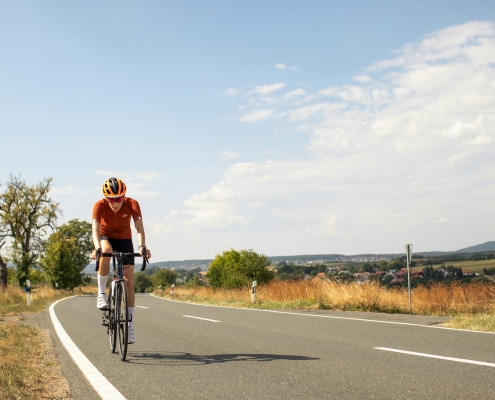Quellen:
Afaghi, A. et al. (2008). Acute effects of the very low carbohydrate diet on sleep indices. In: Nutritional Neuroscience. Volume 11, Issue 4.
https://www.tandfonline.com/doi/abs/10.1179/147683008X301540
Burke, L. M. et al. (2020). Crisis of confidence averted: Impairment of exercise economy and performance in elite race walkers by ketogenic low carbohydrate, high fat (LCHF) diet is reproducible. In: Plos One.
https://journals.plos.org/plosone/article?id=10.1371/journal.pone.0234027
Deutsche Epilespievereinigung: Ketogene Diäten in der Epilepsie-Behandlung.
https://www.epilepsie-vereinigung.de/wp-content/uploads/2020/01/Ketogene-Diaeten-in-der-Epilepisebehandlung.pdf
Gibson A. A. et al. (2014). Do ketogenic diets really suppress appetite? A systematic review and meta-analysis. In: Obesity Reviews.
https://onlinelibrary.wiley.com/doi/10.1111/obr.12230
Harvard, T.H. Chan – School of Public Health: Diet Review: Ketogenic Diet for Weight Loss; unter: www.hsph.harvard.edu (Abruf: 07.04.2022)
https://www.hsph.harvard.edu/nutritionsource/healthy-weight/diet-reviews/ketogenic-diet/
Heatherly, A. J. et al. (2018). Effects of Ad libitum Low-Carbohydrate High-Fat Dieting in Middle-Age Male Runners. In: Medicine & Science in Sports & Exercise.
https://journals.lww.com/acsm-msse/Fulltext/2018/03000/Effects_of_Ad_libitum_Low_Carbohydrate_High_Fat.21.aspx
Ma, S. & Suzuki, K. (2019). Keto-Adaptation and Endurance Exercise Capacity, Fatigue Recovery, and Exercise-Induced Muscle and Organ Damage Prevention: A Narrative Review. In: Sports. Feb; 7(2): 40.
https://www.ncbi.nlm.nih.gov/pmc/articles/PMC6410243/
Maunder, E. et al. (2018). Substrate Metabolism During Ironman Triathlon: Different Horses on the Same Courses. In: Sports Medicine 48, 2219-2226.
https://link.springer.com/article/10.1007/s40279-018-0938-9
McSwiney, F. T. et al. (2018). Keto-adaptation enhances exercise performance and body composition responses to training in endurance athletes. In: Metabolism. Volume 81, P25-34.
https://www.metabolismjournal.com/article/S0026-0495(17)30298-6/fulltext
Plews, D. (2019). Jan Van Berkel: The Ketocop on the Low Carb Healthy Fat Diet; unter: www.endureiq.com (Abruf: 07.04.2022)
https://www.endureiq.com/blog/jan-van-berkel-Low%20Carb%20Healthy%20Fat%20Diet
Rusek, M. et al. (2019). Ketogenic Diet in Alzheimer’s Disease. In: International Journal of Molecular Sciences.
https://www.ncbi.nlm.nih.gov/pmc/articles/PMC6720297/
Sumithran, P. et al. (2013). Ketosis and appetite-mediating nutrients and hormones after weight loss. In: European Journal of Clinical Nutrition 67. 759-764.
https://www.nature.com/articles/ejcn201390
Thieme via medici: Gluconeogenese: Überblick und Reaktionen; unter: https://viamedici.thieme.de (Abruf: 07.04.2022)
https://viamedici.thieme.de/lernmodul/547099/538871/subject/biochemie/kohlenhydrate/stoffwechsel/gluconeogenese+%C3%BCberblick+und+reaktionen
Volek, J. S. et al. (2015). Rethinking fat as a fuel for endurance exercise. In: European Journal of Sport Science. Volume 15.
https://www.tandfonline.com/doi/abs/10.1080/17461391.2014.959564?journalCode=tejs20
Volek, J. S. et al. (2016). Metabolic characteristics of keto-adapted ultra-endurance runners. In: Metabolism. Mar;65(3):100-10.
https://www.metabolismjournal.com/article/S0026-0495(15)00334-0/fulltext
Westmann, E. C. (2202). Is dietary carbohydrate essential for human nutrition? In: The American Journal of Clinical Nutrition. Volume 75, Issue 5.
https://academic.oup.com/ajcn/article/75/5/951/4689417
Zinn, C. et al. (2017). Ketogenic diet benefits body composition and well-being but not performance in a pilot case study of New Zealand endurance athletes. In: Journal of the International Society of Sports Nutrition; 14: 22.
https://www.ncbi.nlm.nih.gov/pmc/articles/PMC5506682/
 https://hycys.de/staging/wp-content/uploads/HYCYS-Mentale-Fatigue-Blogbeitrag-Header-scaled.jpg
1706
2560
Eva Zwilling
https://hycys.de/staging/wp-content/uploads/hycys_logo_white-300x138.png
Eva Zwilling2024-07-24 08:30:442024-07-18 15:32:09Mental Fatigue im Ausdauersport
https://hycys.de/staging/wp-content/uploads/HYCYS-Mentale-Fatigue-Blogbeitrag-Header-scaled.jpg
1706
2560
Eva Zwilling
https://hycys.de/staging/wp-content/uploads/hycys_logo_white-300x138.png
Eva Zwilling2024-07-24 08:30:442024-07-18 15:32:09Mental Fatigue im Ausdauersport





